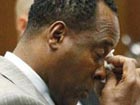| Videos | • Latest |
|
• Feature | • Sports | • Your Videos |
Jackson's voice echoes through court at doctor's trial

 0 Comment(s)
0 Comment(s) Print
Print E-mail
CNTV, September 29, 2011
E-mail
CNTV, September 29, 2011
First, prosecutors showed a photo of Michael Jackson's pale and lifeless body lying on a gurney. Then they played a recording of his voice, just weeks before his death.
Slow and slurred, his words echoed Tuesday through a Los Angeles courtroom at the start of the trial of the doctor accused of killing him. As a worldwide audience watched on TV and Jackson's family looked on from inside the courtroom, a drugged Jackson said:
"We have to be phenomenal. When people leave this show, when people leave my show, I want them to say, 'I've never seen nothing like this in my life. Go. Go. I've never seen nothing like this. Go. It's amazing. He's the greatest entertainer in the world.'"
Prosecutors played the audio for the first time during opening statements as they portrayed Dr. Conrad Murray, 58, as an incompetent physician who used a dangerous anesthetic without adequate safeguards and whose neglect left the superstar abandoned as he lay dying.
Defense attorneys countered that Jackson caused his own death by taking a drug dose, including Propofol, after Murray left the room.
Nothing the cardiologist could have done would have saved the King of Pop, defense attorney Ed Chernoff told jurors, because Jackson was desperate to regain his fame and needed rest to prepare for a series of crucial comeback concerts.
A number of Jackson's family members were in the courthouse, including his father Joseph, mother Katherine, sisters LaToya and Janet, and brothers Jermaine, Randy and Tito. LaToya Jackson carried a sunflower, her brother's favorite flower.
Murray, who arrived at court holding hands with his mother, is charged with involuntary manslaughter. If convicted, he faces up to four years in prison and the loss of his medical license.
Speaking for more than an hour, prosecutor David Walgren relied on photos and audio recordings to paint Murray as an inept and reckless caretaker.
Walgren showed a photo of a lifeless Jackson on a hospital gurney. He juxtaposed the image with those of Jackson performing. Walgren also played the recording of Jackson speaking to Murray while, the prosecutor said, the singer was under the influence of an unknown substance roughly six weeks before his death.
Jackson trusted Murray as his physician, and "that misplaced trust in Conrad Murray cost Michael Jackson his life," Walgren said.
The recurring theme was Jackson's never ending quest for sleep and Propofol, the potion he called his "milk" and that he believed was the answer. Jurors were told that it was a powerful anesthetic, not a sleep aid, and the prosecutor said Murray severely misused it.
The prosecutor said while working for Jackson, the doctor was shipped more than four gallons of the anesthetic, which is normally given in hospital settings.
Chernoff, the defense attorney, claimed the singer swallowed several pills of the sedative Lorazepam on the morning of his death and that was enough to put six people to sleep. After taking Propofol, Jackson did not even have a chance to close his eyes, Chernoff said.
Chernoff, who had long hinted that the defense would blame Jackson for his own death, added a surprise. He claimed Jackson died not because his doctor continued to give him the drug but because he stopped it, forcing Jackson to take extreme measures.
"What we will hear is that Dr. Murray provided Propofol for two months to Michael Jackson for sleep," Chernoff said. "During those two months, Michael Jackson slept. He woke up and he lived his life.
"The evidence will not show you that Michael Jackson died because Dr. Murray gave him propofol. The evidence is going to show you Michael Jackson died when Dr. Murray stopped," the attorney said. He said Murray was trying to wean Jackson off of Propofol and had been giving him other sleep aids known as benzodiazepines trying to lull him to sleep.
On June 25, 2009, the last day of Jackson's life, Chernoff said, he was in the third day of a weaning process and it didn't work.
"Michael Jackson started begging. He couldn't understand why he wasn't sleeping when Michael Jackson told Dr. Murray 'I have to sleep. They will cancel my performance,' he meant it," Chernoff said.
Murray, in a recording of his interview with police detectives, acknowledged that he relented and agreed to give Jackson a small dose of Propofol.
Walgren said Murray's claim that he gave the singer a minuscule dosage, enough to keep him asleep perhaps five minutes, was not true. He also accused Murray of deception when he hid from paramedics and hospital emergency staff that he had given Jackson Propofol. He said they were desperately trying to revive him but didn't know about the drug.
He returned repeatedly to the fee Murray was to be paid — $150,000 a month — and pointed out that he first had asked for $5 million.
"There was no doctor-patient relationship," Walgren said. "… What existed here was an employer-employee relationship. He was not working for the health of Michael Jackson. Dr. Murray was working for a fee of $150,000."
Chernoff countered with a description of Murray's history of treating indigent patients for free. At times during the defense attorney's opening statements, Murray appeared to be crying and wiped his eyes with a tissue.
Jackson's family members appeared pained as Walgren described the singer as a vulnerable figure, left alone with drugs coursing through his body.
"It violates not only the standard of care but the decency of one human being to another," he said. "Dr. Murray abandoned Michael when he needed help."






Go to Forum >>0 Comment(s)